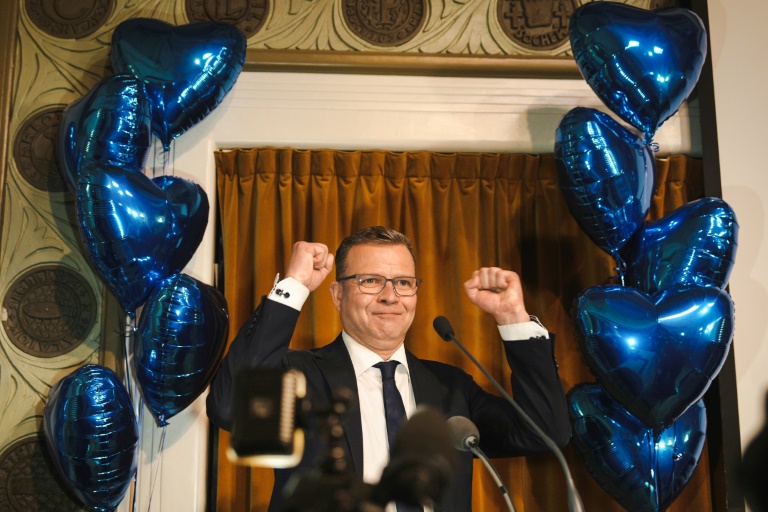AFP
Finland’s next prime minister Petteri Orpo presents a stark contrast to his charismatic predecessor Sanna Marin, with his cool-headed demeanour and focus on reining in spending.
While the centre-right Orpo may not be the most radiant personality in Finnish politics, the 53-year-old’s National Coalition Party beat out the incumbent Social Democrat leader in April’s general election with a campaign focused on the economy.
However, choosing the anti-immigration Finns Party — which came second in the election — as his preferred coalition partner over Marin’s Social Democrats was a decision that raised eyebrows.
Orpo had previously ruled out a collaboration with the Finns Party due to the two parties’ divergent stances on human rights.
But on the day of the election, Orpo was asked about a possible coalition with the Finns Party and replied “there is no far-right party in Finland.”
The more outspoken Marin made international headlines when she became the world’s youngest elected head of government in 2019, at the age of 34.
But while she was hugely popular for her handling of the Covid-19 pandemic, she also became embroiled in scandals.
In one instance, videos of her partying prompted her to take a drug test to clear suspicions.
Meanwhile, Orpo has been described by his peers as amiable and calm — so much so that some have questioned how the married father of two teens has lasted so long in the fiery world of politics.
“He’s a little anonymous, he doesn’t have that charisma. He’s just really a traditional politician,” Helsinki local Otto Syrja told AFP.
But Orpo’s level-headed and policy-oriented approach has served him well, even against more charismatic opponents in the stoic Nordic country where outgoing politicians are often met with suspicion.
Orpo took over the party leadership in 2016 when he unseated former prime minister Alexander Stubb — also known for his energetic charm — who had suffered an election defeat the previous year.
First elected to parliament in 2007, Orpo has previously served as finance, interior and agriculture minister.
Raised in southwestern Finland, he became involved in student politics while at university.
It ended up taking up so much of his time that it took him more than a decade to graduate — earning a master’s degree in political science, having majored in economics.
Following in his father’s footsteps to become a member of Finland’s conservative party, Orpo is considered a pragmatic leader who listens and aims to be inclusive.
“The general perception is that he is a negotiator and a compromiser. I don’t think anyone finds him very strong-willed or difficult,” Karina Jutila, director of the E2 research institute, told AFP.
While that calm usually plays to his favour in heated election debates, Orpo can be put on the back foot by more aggressive public speakers like Marin.
In October, he was accused of belittling women and had to apologise after referring to Marin and Finance Minister Annika Saarikko’s “shrieking” in a debate.
Orpo also stoked controversy in December when he criticised Defence Minister Antti Kaikkonen’s decision to take paternity leave amid Finland’s NATO bid, a comment that was interpreted as enforcing negative stereotypes about fathers.
A fan of the outdoors, Orpo enjoys hiking and fishing, and is known to have taken snowmobile trips with party colleague President Sauli Niinisto in Lapland.
Throughout the election campaign, Orpo was firmly focused on the country’s finances — an area he claimed Marin had neglected.
“The most important thing the National Coalition wants to change in Finland is that we stop increasing debt,” Orpo told AFP in April.
His attention on fiscal rigour could spark some concern in Brussels, with Finland known as one of the “frugal” EU countries that have called on southern European nations to rein in deficits.
Under Marin, Finland’s debt-to-GDP ratio has risen from 64 percent in 2019 to 73 percent.
The National Coalition Party aims to address this by cutting spending by six billion euros ($6.5 billion) over four years, which Marin slammed as “taking from the poor to give to the rich”.
“I want to fix our economy. I want to boost economic growth,” Orpo told AFP in April.
Political scientist Mikko Majander from Helsinki-based think tank Magma said that despite Marin’s popularity, the economy was “a decisive factor” in securing Orpo’s election win.






